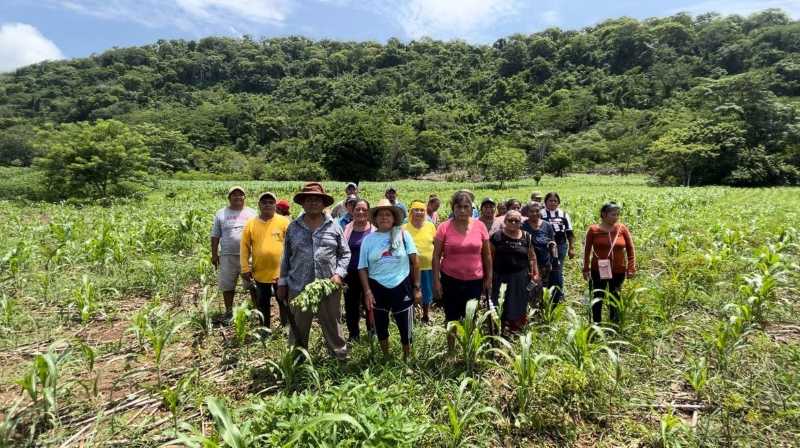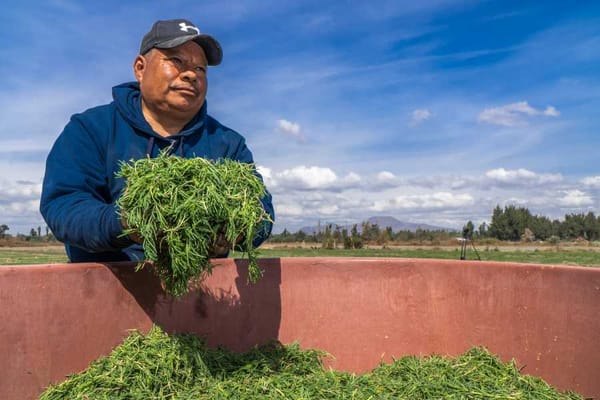How Mexico Supports 2 Million Agricultural Producers
Mexico's Production for Well-being program supports 2 million small/medium farmers growing corn, beans, and other crops. Launched in 2019, it provides direct financial aid, training, and promotes sustainable practices.

Okay, so let’s talk corn. No, not the high-fructose, kernel-liquefied kind that fuels our late-night Cheetos binges. I’m talking about real corn. The kind that grows tall and proud under the Mexican sun, the kind that whispers ancient stories in the rustle of its leaves, the kind that, frankly, most of us have forgotten even exists.
But not Claudia Sheinbaum Pardo. Oh no, she hasn’t forgotten. She’s parked this particular corn – along with some beans, chia, and a whole agricultural cornucopia – squarely on the second floor of the 4T, like some kind of sacred offering to the gods of social justice. And it’s called the Production for Well-being program. Catchy, right?
Now, I’m not a farmer. My closest brush with agriculture involves aggressively pruning my basil plant on the windowsill and mourning its inevitable demise. But even I can smell the ambition – and perhaps the desperation – wafting off this initiative. Two million beneficiaries. Six point two million productive hectares. Numbers like that aren’t just statistics; they’re a declaration. A bet. A wager on the future of Mexico, laid down on a patchwork of small farms, stitched together with threads of hope and subsidized by, well, six thousand four hundred pesos.
Six thousand four hundred pesos. That’s roughly… (checks Google Finance, sighs deeply) …not a lot. But for small-scale farmers, especially those in the south-southeast, the indigenous communities, the women who’ve historically been sidelined in this sunbaked arena – it’s a lifeline. A chance to cling to the land, to nurture the crops that have sustained their families for generations. It's a chance to thumb their noses at the seductive whisper of corporate agriculture, the siren song of factory farms and genetically modified everything.
But here's where the cynicism, that hard-boiled egg yolk I carry around in my chest, starts to crack. Because while the rhetoric of “food sovereignty” and “social justice” is intoxicating – seriously, it makes me want to ditch my overpriced avocado toast and join a commune – I can’t help but wonder: is this just a beautifully packaged band-aid on a gaping economic wound?
Let’s talk Banco del Bienestar. All these farmers, freshly banked, ready to receive their government manna. Sounds great, right? Financial inclusion, access to credit, a step up the economic ladder. But what if it's just another way to track and control? What if the whispers of ancient wisdom are drowned out by the whirring of the bureaucratic machine?
And then there's the training. The "technical support." The push for "sustainable agroecological practices." Sounds like a farm-to-table hipster’s dream. But who’s doing the training? Who decides what’s “sustainable”? Is it a genuine empowerment of these farmers, or a subtle reshaping of their traditional practices to fit a pre-determined mold?
Look, I want this to work. I desperately want to believe that Claudia Sheinbaum Pardo, perched on her second-floor perch, is genuinely committed to uplifting these communities. I want to believe that those two million farmers, scattered across six point two million hectares, are the vanguard of a new, more just agricultural revolution.
But the cynic in me, the one who’s seen too many well-intentioned programs crumble under the weight of their own good intentions, can’t help but squint. Is this a real investment in the future of Mexican agriculture, or just another political corn maze, designed to lead us all in circles? The answer, like the fate of that carefully nurtured basil plant on my windowsill, remains to be seen. And frankly, I’m holding my breath.




